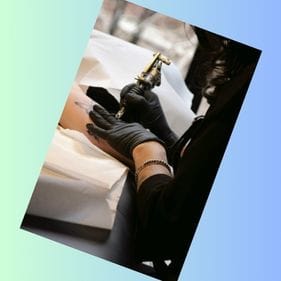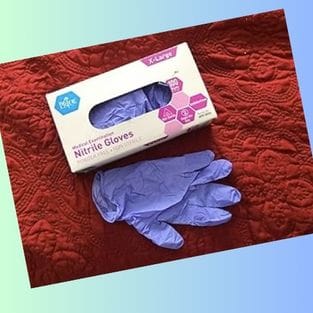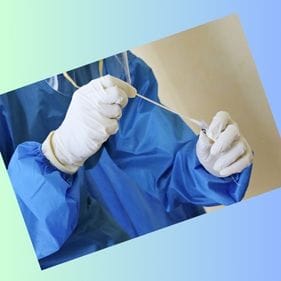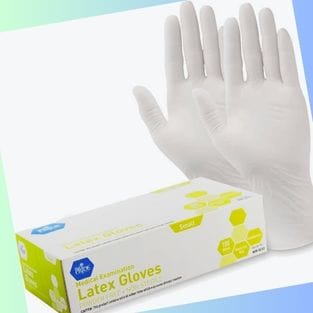When it comes to protecting your hands in various professional settings, choosing the right type of exam gloves is crucial.
Whether you're a healthcare worker, a laboratory technician, or involved in food service, the debate between nitrile, latex, and vinyl gloves is a pertinent one.
In this post, we'll dive into the pros and cons of each glove type to help you make an informed decision.
Key Takeaways:
- Understand the distinct properties of nitrile, latex, and vinyl gloves.
- Learn about the suitability of each glove type for different professional environments.
- Discover the importance of choosing the right glove for allergy considerations and protection levels.
The Basics of Exam Gloves
Before we delve into the specifics, let's cover the basics of what exam gloves are and why they're important.
What are exam gloves?
Exam gloves are disposable gloves used during medical examinations and procedures to help prevent cross-contamination between caregivers and patients.
They come in various materials, each with unique characteristics that make them more or less suitable for certain tasks.
Material Matters:
=> Nitrile Gloves
Nitrile gloves are made from a synthetic rubber that offers excellent puncture resistance and chemical resistance.

*They are a popular choice in environments where durability and protection against hazardous substances are required.
Nitrile gloves are also latex-free, making them a safe option for individuals with latex allergies.
- The Pros of Nitrile
- One of the main advantages of nitrile gloves is their superior resistance to oils, fuels, and certain acids compared to latex and vinyl gloves.
*This makes them an ideal choice for automotive work, hair coloring, or handling oily food.

- Nitrile gloves also tend to offer better protection against viruses and bacteria, which is why they are often favored in medical settings.
- The Cons of Nitrile
Despite their strengths, nitrile gloves are not without drawbacks. They can be more expensive than latex or vinyl gloves, which might be a consideration for budget-conscious facilities.
Additionally, while they are generally more durable, they can still be punctured or torn if not used properly.
=> Understanding Latex Gloves
Latex gloves are made from natural rubber latex and have been the standard in the medical field for many years.

They are known for their high level of touch sensitivity, comfort, and flexibility, which makes them a preferred choice for delicate procedures.
- The Pros of Latex
Latex gloves offer excellent comfort and dexterity, allowing for precise movements during intricate tasks. They are also quite elastic and strong, providing a good barrier against contaminants.
*For procedures that require a high level of touch sensitivity, latex gloves are often the go-to option.

- The Cons of Latex
The major downside of latex gloves is the potential for allergic reactions.
Latex allergies can range from mild skin irritation to severe anaphylactic reactions, posing a risk to both glove users and patients.
Additionally, latex gloves are not as chemically resistant as nitrile gloves, limiting their use in certain environments.
=> Vinyl Gloves at a Glance
Vinyl gloves are made from polyvinyl chloride (PVC) and plasticizers.

They are a cost-effective option for short-term, low-risk tasks where glove durability and high levels of protection are less of a concern.
- The Pros of Vinyl
Vinyl gloves are latex-free, which makes them a safe alternative for individuals with latex allergies.
They are also the most economical choice among the three types of gloves, which can be a significant factor for facilities that go through large quantities of gloves daily.

- The Cons of Vinyl
Vinyl gloves offer less protection against chemicals and pathogens compared to nitrile and latex gloves. They are also less durable and more prone to tearing, which can be a drawback in situations where glove integrity is crucial.
Their fit and comfort are generally considered inferior to latex and nitrile gloves.
Allergies and Sensitivities
When selecting exam gloves, it's essential to consider the potential for allergic reactions.
*Nitrile and vinyl gloves are both latex-free and are safer options for those with latex sensitivities. However, some individuals may also have sensitivities to the chemicals used in the manufacturing of nitrile and vinyl gloves.
Suitability for Different Professions
Different professions require different levels of protection, comfort, and dexterity from their exam gloves.
*Healthcare workers might prioritize nitrile gloves for their superior protection, while those in the food industry might opt for vinyl gloves for short-term use.
It's important to assess the needs of your specific field when choosing the right glove.
Environmental Impact
The environmental impact of disposable gloves is another factor to consider.
- Nitrile and latex gloves are both biodegradable to some extent, although the process is slow.
- Vinyl gloves are not biodegradable, making them the least environmentally friendly option.
Cost Considerations
Cost is always a consideration when selecting exam gloves.
- Vinyl gloves are typically the most affordable, followed by latex, with nitrile gloves being the most expensive.
*However, the cost must be weighed against the glove's suitability for the intended use and the level of protection it provides.
Your Takeaway
Choosing between nitrile, latex, or vinyl exam gloves depends on a variety of factors, including
- the level of protection required,
- potential allergies,
- the task at hand, and
- budget constraints.
*Nitrile gloves offer the best protection and chemical resistance, latex gloves provide superior comfort and dexterity, and vinyl gloves are the most cost-effective for low-risk tasks.
By understanding the pros and cons of each glove type, you can make an informed decision that ensures safety and efficiency in your professional environment.
FAQ Section
Q: Can nitrile gloves be used by people with latex allergies?
A: Yes, nitrile gloves are latex-free and are a safe option for individuals with latex allergies.
Q: Are vinyl gloves suitable for medical procedures?
A: Vinyl gloves are less durable and offer less protection than nitrile or latex gloves, making them less suitable for medical procedures where contamination risk is high.
Q: How do I choose the right glove for my profession?
A: Consider the tasks you perform, the level of protection and sensitivity required, any potential allergies, and your budget. Nitrile gloves are generally preferred for high-risk environments, latex for tasks requiring high touch sensitivity, and vinyl for short-term, low-risk tasks.
Disclaimer.
When you purchase through links on our site, we may earn an affiliate commission (that's how we stay in business). FirstFewFinds may use affiliate links to products and services on retailer sites for which we can receive compensation if you click on those links or make purchases through them. We hope you find the list of our first few finds useful and helpful. Each product on our list has been carefully chosen by our writers and all opinions are our own. Check your choices and enjoy finding exactly what you need!








